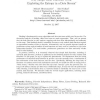Free Online Productivity Tools
i2Speak
i2Symbol
i2OCR
iTex2Img
iWeb2Print
iWeb2Shot
i2Type
iPdf2Split
iPdf2Merge
i2Bopomofo
i2Arabic
i2Style
i2Image
i2PDF
iLatex2Rtf
Sci2ools
130
click to vote
SODA
2008
ACM
2008
ACM
Why simple hash functions work: exploiting the entropy in a data stream
Hashing is fundamental to many algorithms and data structures widely used in practice. For theoretical analysis of hashing, there have been two main approaches. First, one can assume that the hash function is truly random, mapping each data item independently and uniformly to the range. This idealized model is unrealistic because a truly random hash function requires an exponential number of bits to describe. Alternatively, one can provide rigorous bounds on performance when explicit families of hash functions are used, such as 2-universal or O(1)-wise independent families. For such families, performance guarantees are often noticeably weaker than for ideal hashing. In practice, however, it is commonly observed that simple hash functions, including 2universal hash functions, perform as predicted by the idealized analysis for truly random hash functions. In this paper, we try to explain this phenomenon. We demonstrate that the strong performance of universal hash functions in practice ...
| Added | 30 Oct 2010 |
| Updated | 30 Oct 2010 |
| Type | Conference |
| Year | 2008 |
| Where | SODA |
| Authors | Michael Mitzenmacher, Salil P. Vadhan |
Comments (0)

